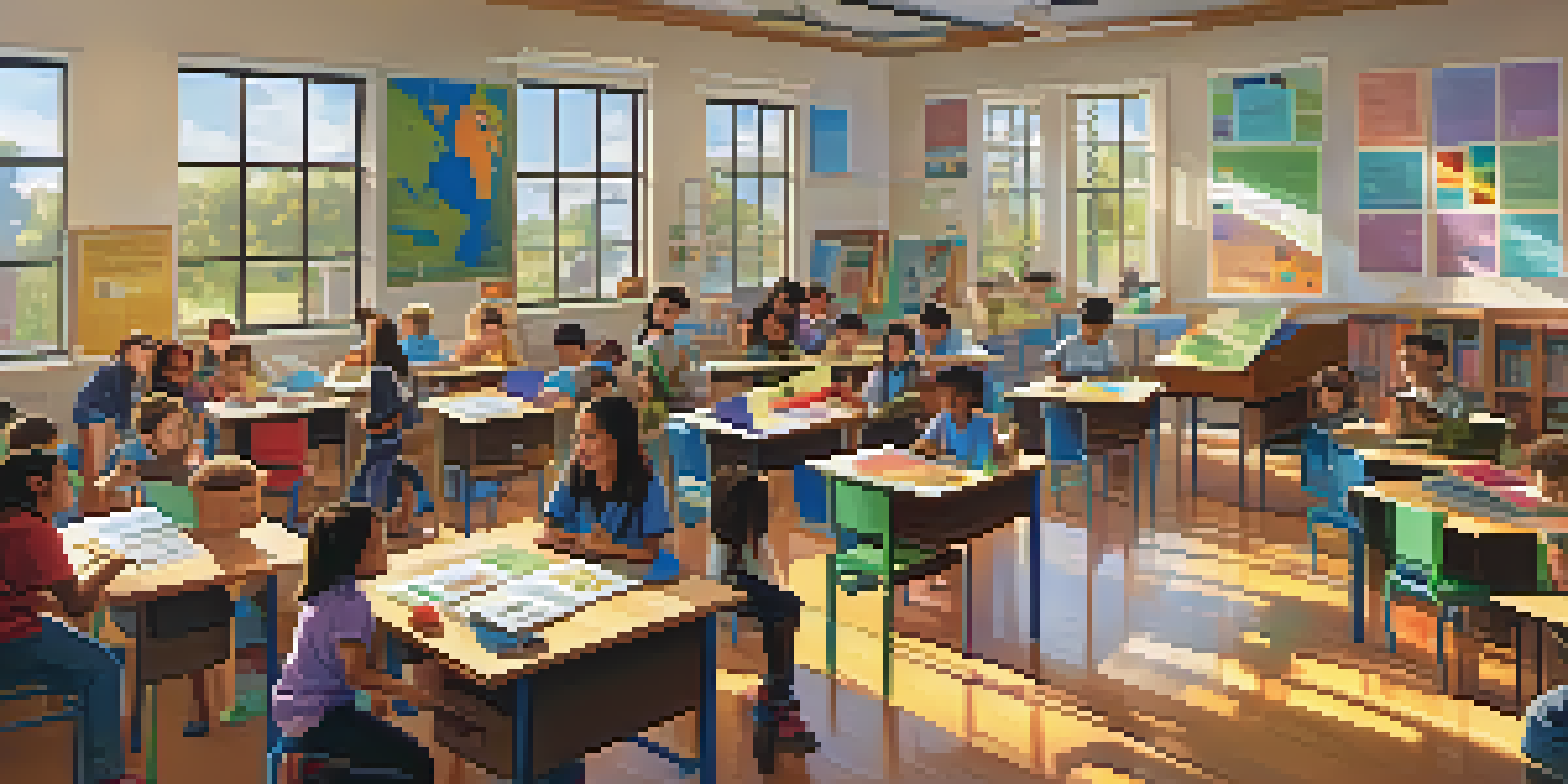Developing Critical Thinking Skills Through Inquiry Learning

Understanding Critical Thinking and Its Importance
Critical thinking is the ability to analyze information, evaluate arguments, and make reasoned decisions. It's a skill that not only enhances academic performance but also prepares individuals for real-world challenges. In today’s fast-paced world, the capacity to think critically can make a significant difference in problem-solving and decision-making.
The mind is not a vessel to be filled, but a fire to be kindled.
This skill allows us to sift through information, distinguishing between facts and opinions, which is increasingly important in an age of misinformation. By fostering critical thinking, we empower ourselves and others to approach problems systematically and creatively. Understanding its importance sets the stage for effective learning strategies, like inquiry learning.
Inquiry learning, which emphasizes questioning and exploration, serves as an excellent method for developing critical thinking skills. By engaging students in the learning process, they become active participants rather than passive recipients of information.
What is Inquiry Learning?
Inquiry learning is an educational strategy that encourages students to ask questions, investigate, and discover answers through exploration. Instead of simply memorizing facts, learners are prompted to engage with the material, fostering a deeper understanding. This hands-on approach makes learning more meaningful and memorable.

For example, instead of learning about ecosystems through textbooks alone, students might explore a local habitat, observe interactions among species, and discuss their findings. This real-world application not only makes the learning process enjoyable but also stimulates curiosity and critical thinking. Inquiry learning shifts the focus from teaching to learning.
Critical Thinking Enhances Learning
Developing critical thinking skills prepares individuals for real-world challenges and enhances their academic performance.
Through inquiry learning, students develop skills such as questioning, hypothesizing, and analyzing data. These skills are not just academic; they are essential for daily decision-making and problem-solving in various contexts.
The Role of Questions in Inquiry Learning
Questions are at the heart of inquiry learning. They drive the exploration process and encourage students to think critically about the subject matter. The types of questions posed can significantly influence the learning experience, guiding students to deeper insights and understanding.
Education is not the learning of facts, but the training of the mind to think.
For instance, instead of asking, 'What is photosynthesis?', a more effective inquiry question might be, 'How does photosynthesis impact the ecosystem?' This question invites students to explore connections and think critically about broader implications. Such open-ended questions promote discussion and collaboration among peers.
Encouraging students to formulate their own questions is equally important. This empowers them to take control of their learning journey, fostering autonomy and confidence. By nurturing a questioning mindset, educators can help develop critical thinkers who are not afraid to seek out knowledge.
Creating a Supportive Learning Environment
A supportive learning environment is crucial for inquiry learning to thrive. Teachers play a vital role in fostering this atmosphere by encouraging risk-taking, curiosity, and open dialogue. When students feel safe to express their thoughts and ideas, they're more likely to engage in meaningful inquiry.
Classroom dynamics can greatly influence students' willingness to participate. Group activities, discussions, and collaborative projects can enhance this sense of community. By creating spaces where students can share their questions and findings, educators can cultivate a culture of inquiry that promotes critical thinking.
Inquiry Learning Fosters Engagement
Inquiry learning encourages students to ask questions and explore, making the learning process more meaningful and memorable.
Moreover, providing constructive feedback is essential. It helps students refine their thought processes and encourages them to think more deeply about their inquiries. A supportive environment not only nurtures critical thinking but also inspires a lifelong love for learning.
Incorporating Technology in Inquiry Learning
Technology can significantly enhance inquiry learning by providing access to vast resources and tools. Online platforms, simulations, and interactive software allow students to explore topics in-depth and collaborate with peers worldwide. This not only enriches their learning experience but also fosters critical thinking skills.
For example, students might use online databases to conduct research, analyze data using software, or participate in virtual labs. These tools can help students visualize complex concepts and engage in hands-on experimentation. Furthermore, technology allows for greater flexibility in how students approach their inquiries.
However, it's essential to teach students how to navigate digital information critically. As they engage with technology, they must learn to evaluate sources and discern credible information from misinformation. This skill is vital for developing their overall critical thinking abilities.
Assessing Critical Thinking Through Inquiry
Assessing critical thinking skills within inquiry learning can be challenging but is essential for tracking student progress. Traditional tests often fail to capture the depth of understanding students gain through inquiry. Instead, alternative assessment methods, such as portfolios, presentations, and peer evaluations, can provide a more comprehensive view of their capabilities.
For instance, students might present their findings from an inquiry project, demonstrating their ability to analyze data and articulate their thought processes. This not only showcases their critical thinking skills but also enhances communication skills, which are vital in any field.
Supportive Environments Promote Growth
Creating a supportive learning environment fosters curiosity and critical thinking, empowering students to take control of their learning.
Additionally, self-assessment encourages students to reflect on their learning journey. By evaluating their own inquiries, they can identify areas of strength and areas for growth, further developing their critical thinking skills. This reflective practice is key to becoming a lifelong learner.
The Lifelong Benefits of Critical Thinking Skills
Developing critical thinking skills through inquiry learning has lifelong benefits. These skills are not limited to academic settings; they are essential for personal and professional success. Individuals who can think critically are better equipped to navigate complex situations, make informed decisions, and solve problems effectively.
Moreover, critical thinkers are often more adaptable, able to adjust their perspectives in light of new evidence. This flexibility is increasingly important in a rapidly changing world where information and technologies evolve constantly. The ability to think critically also fosters creativity, as it encourages individuals to approach challenges from different angles.

Ultimately, nurturing critical thinking skills through inquiry learning not only prepares students for academic success but also empowers them to become informed citizens and effective leaders in their communities. The journey of inquiry doesn’t just end in the classroom; it extends into every facet of life.